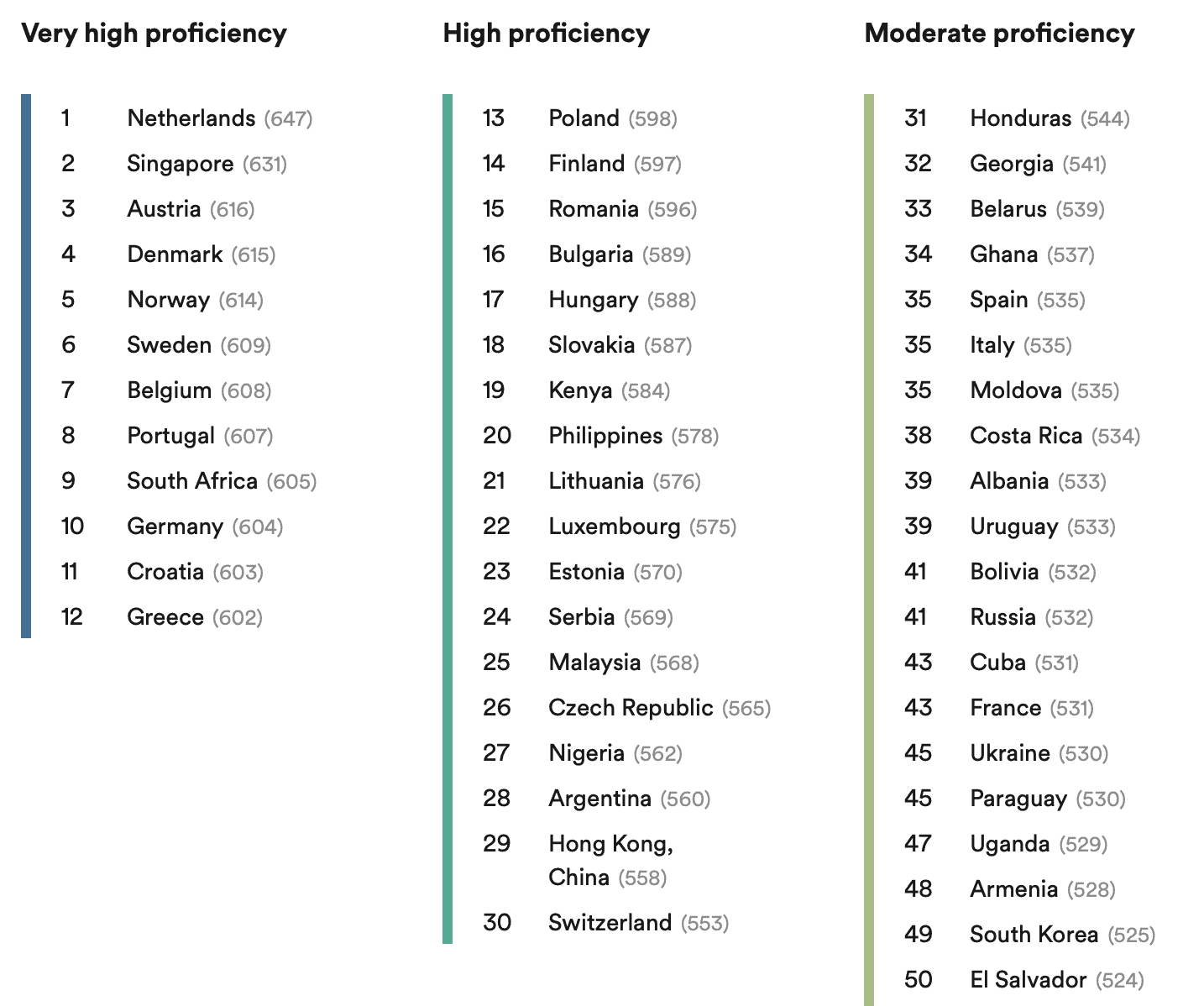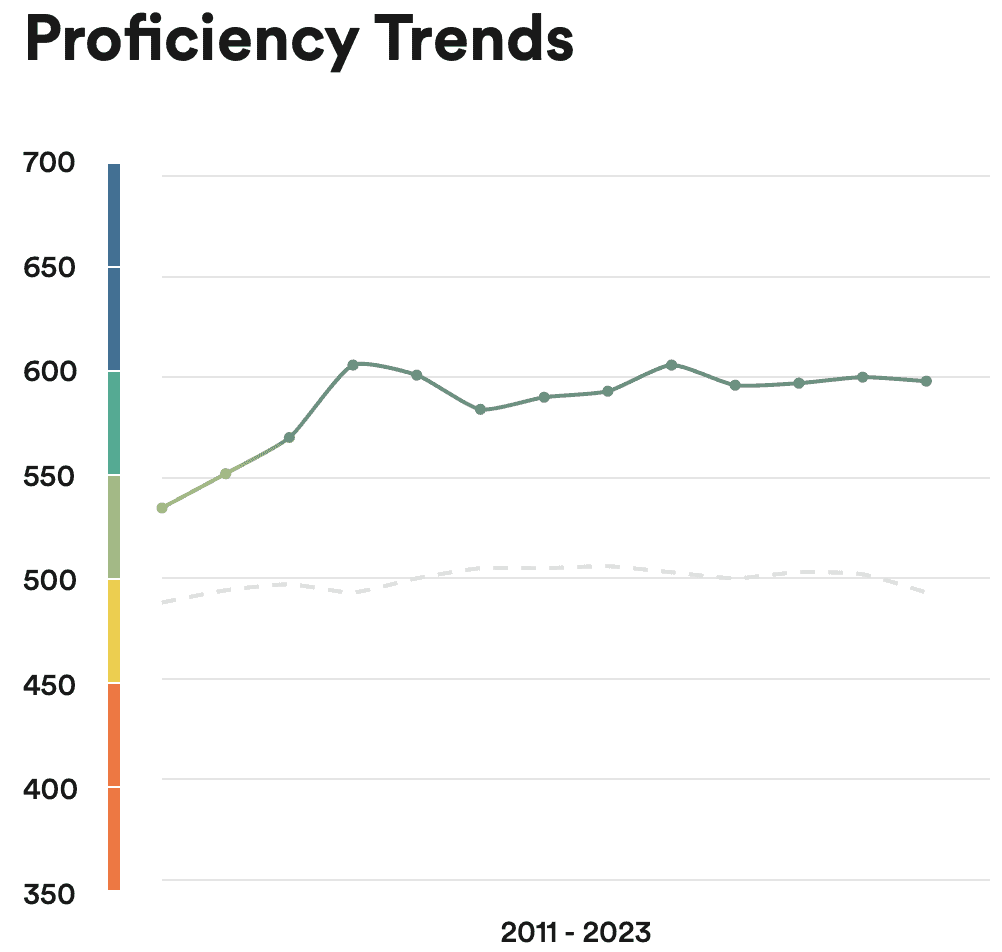This time around, I consider the question: Do Polish people speak English well?
Now, the word “well” is rather subjective.
However, I’m able to draw on some seventeen years of experience with Polish learners of English to sufficiently tackle this question.
Let’s dive in to see what my take is on the general proficiency of Polish learners of English, and which areas I believe they need to improve.
Take the English First English Proficiency Index with a pinch of salt
When someone wishes to check out the average level of English language skills amongst adults from a certain country, one of the first points of reference which Google might throw up is the EF EPI (English First English Proficiency Index).
Unsurprisingly, the Netherlands and Nordic/Scandinavian countries tend to rank the highest from year to year.
Anyway, let’s see how Poland (13th place) fared in 2023 compared with other countries:


Well, as you can see, Poland hasn’t done too badly at all over the years. It’s always been above the global average for English proficiency. Moreover, it’s achieved the ranking of ‘Very high’ proficiency on several occasions. However, these results should be taken with a pinch of salt. The reason for my scepticism is because the EF EPI is based on test scores from the EF Standard English Test (EF SET). This is just a free online standardised English test which is not invigilated by an examiner.
Besides, the EF EPI revolves around multiple choice questions. Any Tom, Dick or Harry can take the test and guess the answers.
I usually correlate “proficiency” with “spoken proficiency”. Not reading proficiency. And not listening proficiency.
Sadly, state school English language syllabuses, outdated teaching methods, negative language transfer and the reluctance of Polish learners of English to implement personalised language learning strategies combine to prevent Poles from achieving a high level of spoken fluency.
Let’s analyse some of these issues now.
English language syllabuses in Poland – Hardly a beacon of optimism
In December, 2020, I published a post on English Coach Online outlining what I believe would be a highly effective spoken English syllabus for secondary school pupils in Poland.
I opened up my post with an overview of some of the main problems with English language syllabuses in Poland. Here’s a summary of the main points:
- Major ELT (English Language Teaching) publishers have a huge say regarding what goes into the English language syllabuses used by Polish schools. Therefore, syllabuses broadly match what appears in these publishers’ coursebooks. It’s all about profits. These publishers have little idea that Polish students of English have serious problems constructing sentences without directly translating from Polish.
- Syllabuses are ridiculously long. For instance, I’ve come across several 100+ page syllabuses for secondary school students. Such detail puts unnecessary pressure on teachers as they have to decide which areas to focus on and which to skip. There’s no way they have time to help students hone language learning strategies because “teaching to the test” always comes first.
- As in most countries, the “grammatical syllabus” reigns supreme in state school English language teaching in Poland. According to advocates of such syllabuses, tenses and grammar points should be taught in a set order. The supposedly “easy” items come first. Hence, teachers usually teach the verb “be” first, closely followed by the present simple and present continuous tense aspects. It is my contention that language learning does not occur in a wonderfully perfect linear order. Moreover, the present continuous is not even worth teaching because native speakers of English barely use it.
All in all, until the Ministry of Education does away with tradition and reforms the system, adult Polish speakers of English will never speak English as well as the Scandinavians, Russians and Austrians etc.
Negative Language Transfer – Polish to English
Another area I’ve written extensively about is negative language transfer from Polish into English.
This phenomenon of negative transfer, also known as language interference, occurs due to structural dissimilarities between two languages. To simplify – imagine a Polish person who directly translates structures from Polish into English, hoping that the two languages are structurally similar.
My argument is that many Polish learners of English are clones of one another – due to negative language transfer. My reasonable knowledge of Polish usually informs me when students directly translate from Polish into English. Check out this list of ten typical errors Polish learners of English make owing to language interference.
Fossilization, a process which describes how certain errors become ingrained and can’t be effortlessly eradicated from speech, has overtaken the majority of adult Polish learners’ of English speech.
The mantra “think in English” is bandied about a lot by enthusiastic linguists. Of course, it’s not so simple to think in a foreign language and reverse the processes of fossilisation and negative transfer. However, check out these steps which can help to combat fossilisation.
When it comes to negative language transfer, Polish learners of English are victims of grammar-focused teaching which pays scant attention to the typical issues ADULT speakers of English face. These negative interference issues are not so noticeable at school because kids are rarely given the freedom to express themselves in the classroom.
Language learning strategies and the need to personalise
I believe that Polish learners of English could do with stepping out of their comfort zones more than they do.
Sadly, I’ve only witnessed a few students who’ve employed the use of language learning strategies with any great conviction in their free time. Without a language learning strategy to store newly-learned pieces of language, it’s hard to stay motivated when learning a language.
I’ve always advocated the use of a Word-Phrase Table to store newly-learned words and phrases. This strategy features quite heavily in my blog posts so head over to English Coach Online to check it out.
Final Thoughts – Do Polish people speak English well?
When someone asks me “do Polish people speak English well?”, I have to be frank in my response.
I just think that adults belonging to so many other European nations speak better English. This group of countries includes Russia in my view.
Sadly, Polish learners of English are at the mercy of an outdated education system with methodology and syllabuses not cut out for the modern world we live in.
Having stated that, there’s a lot Polish learners of English can do to immerse themselves more deeply in English in order to overcome the processes of negative language transfer and fossilisation.

